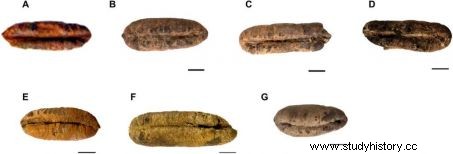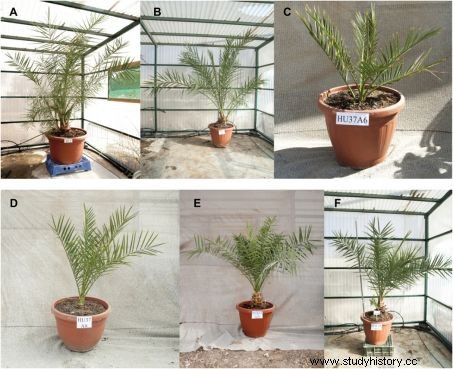An international team of researchers has successfully germinated six date palms from seeds found at ancient sites in southern Israel. 2,000 years old, they could provide valuable information on the longevity of the DNA of these plants.

After the first germination of a seed in 2008, six other small palm trees have managed to grow from seeds that are more than 2,000 years old.
About 7,000 years before Christ, in Mesopotamia and the upper Arabian Gulf, man began to cultivate one of the most popular fruits in his history:the date. According to archaeo-botanical archives, the cultivation of its tree, the date palm, would also be the very first domestic arboreal culture of humanity. Today, historians agree that this small, very sweet fruit with an elongated stone played a determining economic role in the southern Levant (Israel, Palestine and Jordan today), especially since it held symbolic and religious importance for many centuries throughout the Middle East and part of North Africa.
A fruit that disappeared centuries ago
At the dawn of the first millennium, the date of Judea – a region that today corresponds to part of the West Bank and southern Israel – was renowned throughout the Roman Empire for its fleshy flesh, its sweetness and its exceptional storage capacity. One of its varieties, the "Nicolai" Judean date, impressed with its exceptionally large size - up to 11 centimeters long! The Roman scribe Pliny the Elder notably wrote in Book 13 of his Natural History that "the great quality of these dates [was] to have a smooth, milky juice and a kind of vinous flavor joined to a very sweet honey taste". Unfortunately, if we know that the culture of the date of Judea continued at least until the 11th century of our era, the various waves of successive conquests of the region proved to be so destructive that in the 19th century, no trace of the plantations of these famous palm trees with legendary fruits was found.
Enough to make the feat achieved by an international team of researchers, led by Dr. Sarah Sallon, director of the Louis Borick Center for Natural Medicine Research in Jerusalem, very exciting:from seeds of Phoenix dactylifera (from the name of these extinct date palms) 2,000 years old, scientists have managed to grow six small palm trees in the hope of one day harvesting dates. The results of their work were published on February 5, 2020 in the journal Science Advances .
Palms already resulting from crosses
First, scientists had to handpick several hundred seeds found between 1963 and 1991 in two distinct locations:caves scattered along the Dead Sea coast, used at the time as storage spaces and as living quarters. , and within the fortress of Masada, a complex made up of several palaces perched on a mountain and whose construction dates back to the reign of Herod the Great.

(A) Adam, (B) Jonah, (C) Uriel, (D) Boaz, (E) Judith, (F) Hannah and (G) HU37A11, an unplanted seed. © Guy Eisner
34 seed specimens – the most promising – were then isolated, soaked in hot water, gibberellic acid and fertilizer, and finally planted in sterile potting soil. Of these 34 seedlings, six eventually germinated into a small date palm similar to those found in Judea around the early years of our era. Already in 2008, the same team managed to germinate a very first date palm seed found in Masada and 1,900 years old, bringing the number of date palms from ancient Judea still alive today to seven.
But how can we be sure that these seeds date precisely from this golden age and not from the following centuries, under Arab domination, when the culture of the date of Judea was intended to be less prosperous? By carbon-14 dating small fragments of seed shells that remained attached to young shoots after germination, the researchers were able to establish that the seeds were indeed between 2200 and 1800. But it was the genetic analysis of the plants that provided the most information. more interesting about them:according to his results, several specimens would come from crosses between female and male date palms originating from different regions of the world. “There is reason to suppose that sophisticated agricultural practices might have contributed to the historical reputation of the Judean date” , can we read in the study.
Phoenix dactylifera, amazing "philosopher's seed"
The palms obtained today could also provide valuable information on how these plants manage to preserve their DNA for so long, even after several thousand years. "Given its exceptional [DNA] storage potential, the date palm is a remarkable model for seed longevity research." To date, the seeds of Phoenix dactylifera are the oldest to have germinated - a record already beaten in 2008 with the first small palm tree obtained by Sarah Sallon's team, ahead of a lotus seed that began to grow after a 1,300-year slumber.

Age in months at time of photograph:Adam, 110 months; Jonah, 63 months; Uriel, 54 months; Boaz, 54 months; Judith, 47 months; and Hannah, 88 months. © Guy Eisner
"Little is known about the mechanisms determining seed longevity. However, it is speculated that they may be related to keeping them dry in a quiescent state" , say the researchers. Indeed, the study specifies that the rare precipitation and the very low humidity prevailing around the Dead Sea could be seen as ideal storage conditions. A second track is mentioned:the Dead Sea region, located about 400 meters below sea level, has the thickest atmosphere in the world. It is therefore intended to be more hermetic to solar radiation.
Another question remains unanswered:will we ever be able to taste the famous Judean date again?
